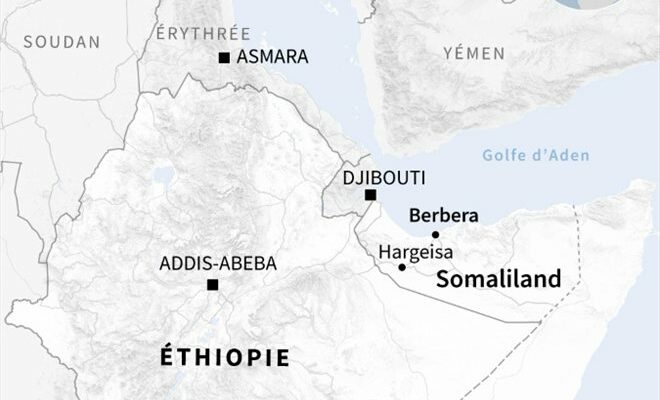Somalis demonstrate against the agreement between Ethiopia and the territory of Somaliland, in Mogadishu, January 3, 2024 (AFP/ABDISHUKRI HAYBE)
Ethiopia has assured that the maritime agreement it signed with the separatist region of Somaliland does not transgress “any law”, in response to the anger aroused in Somalia by this text deemed “illegal” against which residents of the capital demonstrated on Wednesday.
This “memorandum of understanding” signed on Monday has revived fears of a renewed tension between the two neighbors with historically tumultuous relations.
The text plans to grant Ethiopia access to twenty kilometers of coast in the self-proclaimed republic of Somaliland, on the strategic Gulf of Aden, for a period of 50 years. According to Addis Ababa, Ethiopia will benefit from “a permanent naval base (…) and commercial maritime services in the Gulf of Aden thanks to a leasing agreement” (rental).
Somaliland President Muse Bihi Abdi said Monday that in exchange Ethiopia would “formally recognize the Republic of Somaliland”, something no country has done since it unilaterally proclaimed its independence from Somalia in 1991.
The Somali authorities condemned this text as “illegal”, denouncing Ethiopian “aggression” and “a flagrant violation of (its) sovereignty”.
In a statement on Wednesday, the Ethiopian government assured that “no party or country will be affected by this memorandum of understanding.” “There is no broken trust and no laws have been broken,” he said.

Young Somali women demonstrate against the agreement between Ethiopia and the territory of Somaliland, in Mogadishu, January 3, 2024 (AFP/ABDISHUKRI HAYBE)
He does not say that he will recognize Somaliland, but that he will conduct “an in-depth assessment with a view to taking a position on Somaliland’s efforts to obtain international recognition.”
Addis Ababa also emphasizes that the self-proclaimed republic has already “signed agreements with different countries, in particular agreements for port development”. “Yet there were no murmurs or complaints when this materialized,” he points out.
– “Impossible” –
The Somali authorities have been mobilizing since Tuesday against the text, which they have promised to fight by “all legal means”.
In Mogadishu, hundreds of residents, including many schoolchildren, gathered on Wednesday at the Konis stadium.
They chanted slogans hostile to Muse Bihi Abdi and Ethiopian Prime Minister Abiy Ahmed, and brandished signs proclaiming “Not an inch of our territory is for sale” or “Somalia belongs to the Somalis”.

Somalis gather in a stadium to demonstrate against the agreement between Ethiopia and the territory of Somaliland, in Mogadishu, January 3, 2024 (AFP/ABDISHUKRI HAYBE)
“Ethiopia thinks it can take advantage of the weakness of the Somaliland administration to buy our territorial waters, but it’s a dream (…) It’s impossible,” declared one of the demonstrators, Omer Ali, the head covered with a Somali flag.
The Somali government received the support of the Arab League, which said it was “in full solidarity” with an agreement that was “null, void and unacceptable, representing a flagrant violation of the sovereignty and territorial integrity of Somalia, as well as international law.
Egypt also expressed its “opposition to any measures aimed at undermining Somali sovereignty, emphasizing the exclusive right of Somalia and its people to benefit from its resources.”
Cairo, in conflict with Ethiopia over the mega-dam it built on the Nile, also warns of the “danger” of actions that “undermine stability in the Horn of Africa “.
– “Concern” –
The Intergovernmental Authority on Development (Igad) – an East African organization of which Ethiopia and Somalia are members – expressed its “deep concern”, saying it was “aware of the potential implications for regional stability”.

Ethiopia-Somaliland agreement on Ethiopian access to the sea (AFP/Sylvie HUSSON, Valentina BRESCHI)
She called on “the two brotherly countries to collaborate for a peaceful and amicable resolution of the situation.”
But the Mogadishu government “rejected” this statement, which “does not condemn the Ethiopian government for violating the sovereignty and territorial integrity of Somalia.”
On Tuesday, the European Union stressed the importance of respecting “the sovereignty and territorial integrity” of Somalia, “key to the peace and stability of the entire Horn of Africa region”.
The second most populous country in Africa, Ethiopia has been seeking access to the sea for thirty years, which it lost after the independence of Eritrea in 1993.
A region of 4.5 million people that prints its own currency, issues its passports and elects its government, Somaliland has been seeking international recognition since it proclaimed its independence in 1991, as Somalia plunged into chaos. from which she still has not emerged.
© 2024 AFP
Did you like this article ? Share it with your friends using the buttons below.




